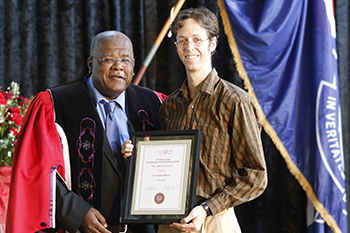Latest News Archive
Please select Category, Year, and then Month to display items
![]()
The University of the Free State (UFS) has an enrolment plan for 2007–2019 that was approved by the Department of Higher Education and Training (DHET). The university is compelled to adhere to these enrolment targets, as over-enrolment poses a risk to the academic integrity, financial sustainability, and student success of the university.
The UFS received 47 000 applications for admission in 2018, of which 17 000 applicants received final admission. All admission letters clearly stipulate that admission is subject to availability of space during registration. The enrolment target for new first-time entering students for 2018 is 8 000, therefore only 8 000 students can be registered across the university’s three campuses during this intake period.
The Executive Management of the UFS welcomes the fact that President Jacob Zuma’s announcement on 16 December 2017 about free education for the poor and working class has allowed many more students the opportunity to register. Several meetings between the Executive Management and the Student Representative Council (SRC) have taken place since the beginning of 2018 to discuss the implications of the President’s announcement. Engagement with the SRC regarding the registration process is also continuously taking place.
Online registration for all students opened on 8 January 2018. The UFS has put several measures in place to assist new first-time entering undergraduate students. Furthermore, students who have moved into residences and participated in the university’s Gateway Programme, as well as students who arrived on campus, were assisted to register for programmes with available space. In cases where the first option of study was full, students were redirected to other programmes with available space within the specific faculty or other faculties, provided that they comply with the relevant admission criteria. Only mainstream programmes in the Faculty of Economic and Management Sciences now have space left. The rest of the undergraduate programmes in all faculties on all the campuses are full.
Students who could not be accommodated in any of the programmes due to limited space are being directed to the Central Application Clearing House (CACH).
Book Prize for Distinguished Scholarship awarded to Dr Christian Williams
2016-03-24

Prof Jonathan Jansen, Vice-Chancellor and Rector of the University of the Free State and Dr Christian Williams, senior lecturer at the UFS Department of Anthropology.
Photo: Johan Roux |
When Dr Christian Williams moved from the United States to Namibia in January 2000 as part of the WorldTeach volunteer programme for teachers, he had not anticipated an award-winning piece of scholarship in his future. It was during these visits to Namibia, though, that the seeds for his highly-acclaimed book were sewn.
While volunteering at the St. Therese Secondary School in Tses at that time, Dr Williams – now a senior lecturer at the University of the Free State (UFS) Department of Anthropology – became acquainted with some of the school’s alumni. The stories these individuals started sharing with him soon revealed personal histories of exile and violence by fellow SWAPO (South West Africa People’s Organization) members.
These experiences ultimately resulted in Dr Williams’ book, National liberation in postcolonial southern Africa: a historical ethnography of SWAPO’s exile camps, published last year. Due to the book’s literary impact, the university awarded Dr Williams the UFS Book Prize for Distinguished Scholarship on Friday 19 February 2016. Dr Williams is the second academic to be awarded this prize.
Politics of the past
In the 1960s, Namibians mobilised and retaliated against colonial rule under the liberation movement known as SWAPO. This created political tension which resulted in the flight of many SWAPO members to exile camps administered by the party.
“Over its three decades in exile, SWAPO was responsible for the welfare of roughly 60 000 Namibians. This was about 4% of the total Namibian population at independence – most of whom lived in camps,” says Dr Williams. The research originally used as a basis for his doctoral thesis was subsequently developed into this prize-winning book.
Advancing the Human Project
“It’s an honour to receive recognition from the university; it means that they value the kind of work that I am doing. I think it’s great for universities to have such prizes,” Dr Williams says.
Supporting the UFS Human Project, Dr Williams will donate a portion of the R25 000 prize money towards the UFS Student Bursary Fund Campaign, as well as the school in Namibia.The rest will subsidise the purchase of the book for distribution to libraries and as gifts.